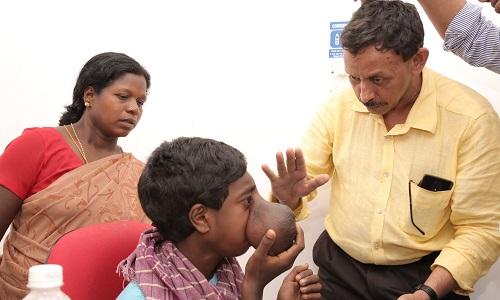In a rare surgery, a Kochi hospital removed a fist-sized brain matter growth from a tribal boy’s face. The rare medical condition called encephlocele, an external sac-like growth through gaps in the skull, was removed after an 11-hour surgery at Amrita Institute of Medical Sciences & Research Centre.
In a rare surgery, a Kochi hospital removed a fist-sized brain matter growth from a tribal boy’s face. The rare medical condition called encephlocele, an external sac-like growth through gaps in the skull, was removed after an 11-hour surgery at Amrita Institute of Medical Sciences & Research Centre. The surgery involved reconstruction of a part of the skull, repositioning of the eye-sockets and re-modelling of the nose.
The fist-sized ball of brain matter used to hang like a pendulum from the nose of the tribal boy, Manikandan from Parambikulam in Palakkad district of Kerala. It obstructed his vision and deformed his nose and face.
“It was a complex surgery. Manikandan’s encephlocele was very large which had pushed the bone of his right eye outwards. For surgery, his skull was opened and the normal brain isolated from the sac of non-functioning brain matter hanging from his face,” said Dr. Subramania Iyer, Head of Plastic & Reconstructive Surgery at Amrita Institute of Medical Sciences.” The removal of the deformity left a defect in the skull, a portion of which had to be reconstructed. The patient’s eye sockets were repositioned to remove the deformity in the right eye, and the nose was also remodelled. All these were huge surgical challenges.”
Manikandan, son of a plantation worker, is now fully recovered and ready for discharge. Kerala government funded the treatment.
“Because of the huge deformity on his face, he never went to school or mingled with others, as people used to make fun of his appearance. After surgery, he is eager to go back home, start school and make friends. I thank the doctors of Amrita Hospital from the bottom of my heart for enabling him to lead a normal life,” said his father Selvam.
Encephalocele is a rare congenital disorder – found in 1 in 5,000 births – in which bones of a baby’s skull do not close completely in the mother’s uterus. This creates an opening through which brain tissue and cerebro-spinal fluid protrudes out of the head in a sac-like structure. The condition can be fatal if the encephalocele hampers development of the brain. Past infancy, patients usually live an isolated life, ashamed to show their face in public.


